Breville Barista Express vs Gaggia Classic Pro, which is my pick? Well, it’s a tough decision because both are the best-selling products on the market. But if I have to choose one, I will go for the Barista Express because of its versatility to switch between automated and manual stages.
The Breville Barista Express is a semi-automatic machine, meaning that I can take advantage of the machine’s automation while manually controlling the espresso extraction quality. It uses the single thermocoil heating system combined with PID temperature control for higher water consistency. Its built-in grinder has enough grind settings to dial in the proper fineness. Its pressure gauge and separate hot water dispenser are handy and help me a lot in my espresso-making learning journey.
For me, the Gaggia Classic Pro is one of the ideal machines for beginners. It has the capacity to handle a broad array of tasks while allowing users to identify specific areas they want to work on. In my own experience, the Gaggia Classic Pro can produce good-quality espresso and frothy milk textures, but it requires a lot of time and effort for practice. However, it is a complete manual espresso machine, so it is inferior in the realm of convenience and utility.
Breville Barista Express Vs Gaggia Classic Pro: Comparison Chart




Last update on 2025-12-20 / Affiliate links / Images from Amazon Product Advertising API
Breville Barista Express Vs Gaggia Classic Pro: Differences
In the Breville Barista Express vs Gaggia Classic Pro match, the lead is for the Barista Express with a score of 4-0 against its rival. In all assessments, the Barista Express proves convenient and user-friendly. However, the Gaggia Classic Pro is also a competent opponent owing to its durability and good extraction performance at its price range.
Coffee flavor & Brewing system
Winner: Breville Barista Express
Coffee input & Grinder
The built-in grinder is one of the features that makes a significant difference in the price tag between the Breville Barista Express vs Gaggia Classic Pro. The Barista Express features a stainless steel conical burr grinder with 16 grind size settings. Besides, if you find that the grind is not fine enough, even when you’ve changed the grind fineness setting, you can access the top burr and reduce its grind range.
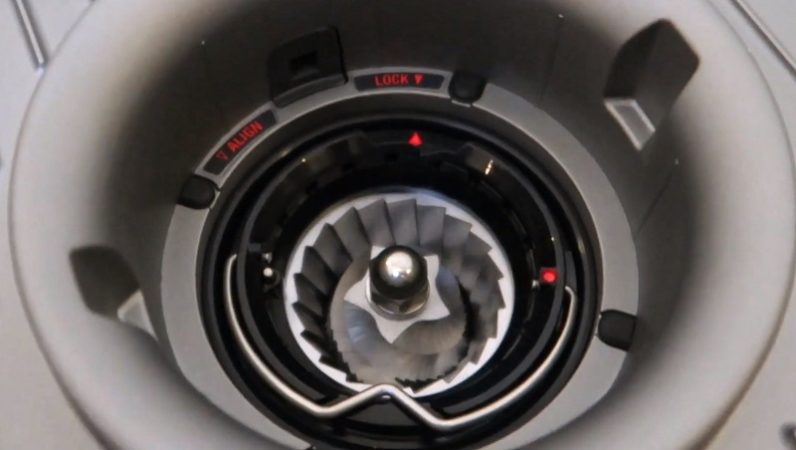
On the other hand, the Gaggia Classic Pro is not built with a grinder, meaning if you want to use freshly ground coffee beans, you need to purchase a separate grinder. This means you can also use the pre-ground coffee bought from the supermarkets if you’ve not got a good grinder yet. Additionally, the Gaggia Classic Pro is compatible with ESE pods for easy and quick espresso-making, suitable for use on hectic days.
Heating system
Both machines use a single heating element, so they cannot brew and steam at the same time. The difference is that the Gaggia Classic Pro utilizes the boiler heating system while the Barista Express uses the thermocoil one. Yet, they heat up quickly but not instantly, about 5-7 minutes to reach the right temperature.
The boiler system with dual thermostats of the Gaggia Classic Pro ensures the brew group head is also heated when the boiler is heating up. This contributes to keeping a consistent temperature during the extraction, resulting in good-tasting espresso cups.
On the other hand, the thermocoil heating system of the Barista Express is equipped with PID temperature control, providing excellent temperature consistency shot after shot. The equipped PID control also effectively diminishes the temperature variation often happening with the single-heating system.
Moreover, the Barista Express offers an advanced temperature setting for adjusting the brewing temperature by ±4oF, and this feature is not included in the Gaggia Classic Pro’s setting.
Brewing performance
Both the Breville and Gaggia machines have pre-infusion followed by the 15-bar high-pressure extraction for the brewing process. This procedure ensures the water is infused uniformly into the coffee ground to expand for an even and optimal extraction. In this way, the resulting espresso cups will have a nice aroma, beautiful honey color, creamy body, and thick crema.
However, the Barista Express allows me to control the pre-infusion time manually. Thus, I can have a longer pre-infusion duration for a stronger-flavor cup. Yet, the longer pre-infusion should come with a shorter extraction time and vice versa to avoid over-extracted or under-extracted espresso shots.
Design & Convenience
Winner: Breville Barista Express
Drink options & Programmability
Like other entry-level manual espresso machines in the market, the Gaggia Classic Pro does not have program settings. Using it is very straightforward. Simply turn on the machine, weigh and grind the coffee bean into the portafilter, tamp the coffee ground, insert the portafilter into the brew head, press the brewing switch, and then stop the brewing process manually after getting the desired amount.
Therefore, to manage the brewing process with Gaggia Classic Pro, you should use a small scale to weigh your coffee ground amount and the extracted volume.
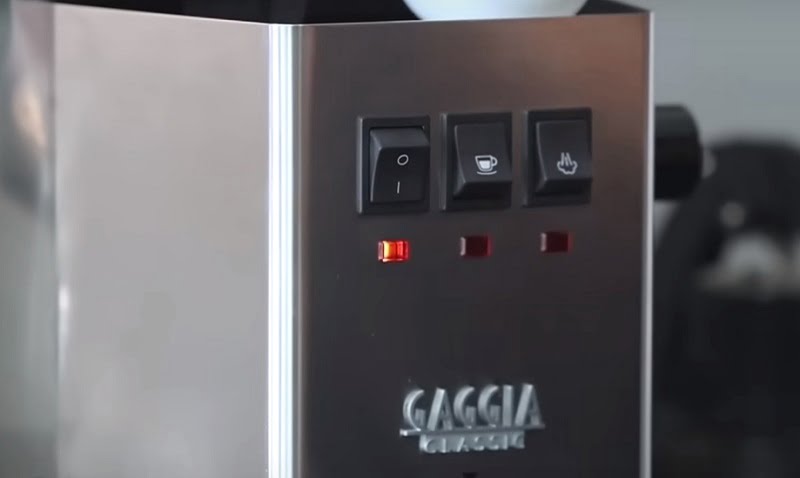
On the other hand, the Barista Express has auto-dosing and auto-shot volumetric control so that you don’t have to keep an eye on your extraction to avoid overflowing your cup. Particularly, the machine allows you to set the grind amount suitable for the chosen filter basket. You can also easily pull single or double-shot espresso with a touch of a button.
Additionally, on the Barista Express, you can change the volumetric presets or manually override them if you want to. With that convenient programmability, I can get consistent pull most of the time without meticulously weighing the amount and volume. Once all things are set, I just need to press the button, and the machine will do the rest.
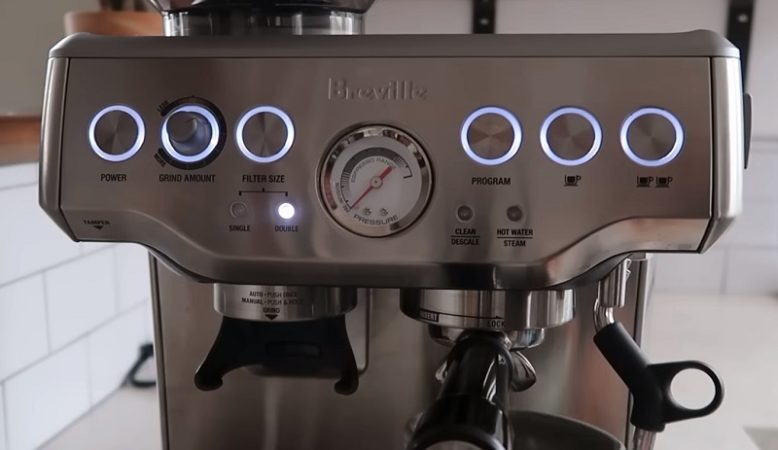
Capacity & Dimension
I feel that the Gaggia Classic Pro boasts a more solid built quality because its frame is all metal, giving a sleek and retro look. Meanwhile, the Barista Express has some plastic parts on the case; however, it is not easy to break and looks very stylish on the countertop.
Moving on to the capacity, I am surprised that the Gaggia Classic Pro has a larger water reservoir than the Barista Express, though its dimension is more compact. Its 72 oz water reservoir is removable from the front, not from the back of the machine like the one on Barista Express.
Additionally, the Gaggia’s water tank can be filled either from the front or the top, and the water level is very easy to track. The removable frontal water tank is also an ideal feature if you have a low-hanging cabinet and reduces the need to move the machine back and forth every time for refilling.
However, there is one thing I do not like about the Gaggia Classic Pro’s water reservoir: it is not completely sealed, making it easy for dust to get its way into the reservoir. The back water tank of the Barista Express has a lid, effectively sealing the water content from dust and other environmental factors.
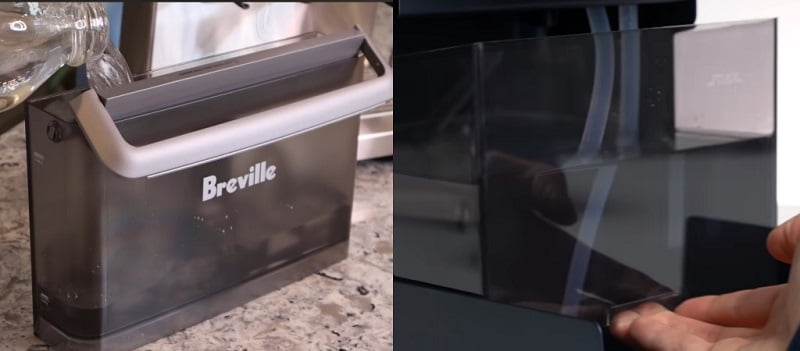
Pressure gauge & hot water dispenser
The Barista Express has both a separate hot water dispenser and pressure gauge, setting it apart from the Gaggia Classic Pro. The Gaggia Classic Pro does not have the pressure gauge, but its switch control interface is very user-friendly. After some testing and going through the manual, I can easily make a good espresso using my acquired skills.
Talking about the pressure gauge of the Barista Express, I do like it. It is truly a nice assistant helping me with my espresso-making learning process. It can tell me when my shot is well-extracted. Once I notice the needle of the gauge located in the espresso zone, I can be confident that I’ve pulled a nice-bodied and flavorful shot. Meanwhile, if the needle is out of the optimal zone, it’s a sign for me to adjust variables like the grind fineness or grind amount.
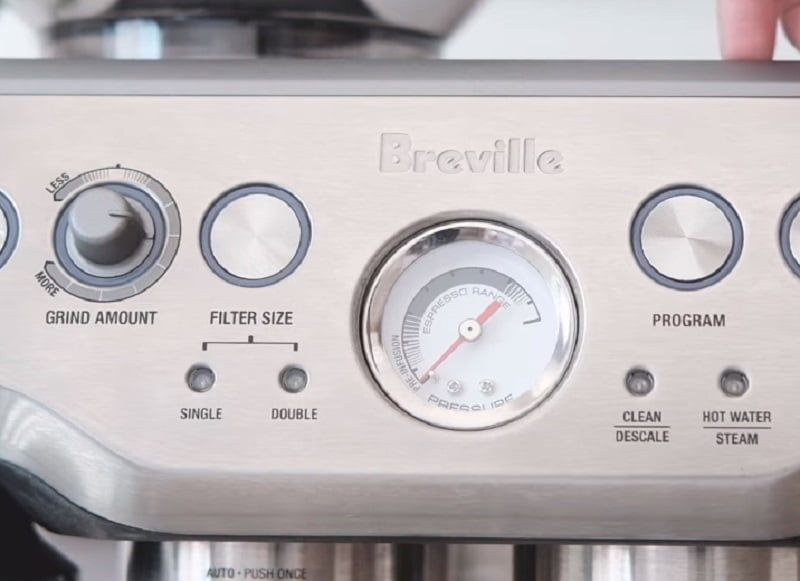
Additionally, the Barista Express is equipped with a separate hot water dispenser situated to the right of the brewing group head. It is handy and convenient for preparing an americano as I can get hot water immediately after pulling my shot, just by turning the steam knob to the hot water position.
Meanwhile, the Gaggia Classic Pro delivers hot water from its steam wand by pressing the brew and steam switch at the same time after turning the steam knob in the clockwise direction. For me, integrating the steam and hot water functions of the Gaggia Classic Pro is a bit inconvenient to use. So, I’m more on the side of the Barista Express in this round.
Other utilities
The Barista Express has the auto-off function while the Gaggia Classic Pro does not, so I pick the Express as the winner of this round. In fact, the Gaggia Classic Pro has the standby mode (auto-off after 20 minutes), but this function is only available for the products distributed in WE (Western Europe) markets.
The Barista Express will go into sleep mode after an hour of inactivity and then automatically shut off after 3 hours from the last interaction. Moreover, the Barista Express includes the cleaning kit to support the cleaning routine and a storage tray to keep the unused filter basket and other accessories neatly.
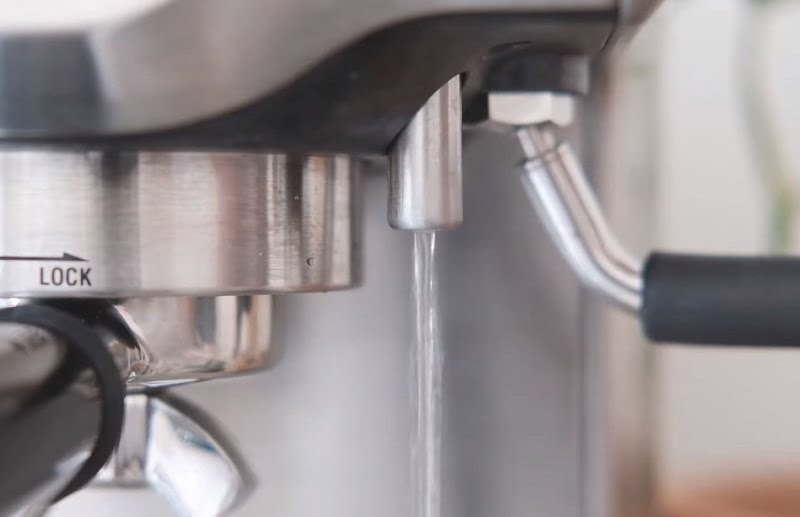
Milk system
Winner: Breville Barista Express
Generally, both machines feature commercial manual steam wands. This means both of them require you certain milk texturing techniques to get nice milk froths for different milk-based espresso drinks. Besides, it takes a while to transition from brewing to steaming as these machines utilize a single heating element for operation. However, the steam wand of the Barista Express is better in ergonomic and auto-purge function.
The steam wand of the Gaggia Classic Pro is not on a ball joint like the Barista Express’s, so it does not move upward and downward, limiting the wand’s movement range as well as the steaming space. As a result, it makes texturing milk with Gaggia Classic Pro more difficult and takes more time to practice.
On the other hand, the steam wand of the Barista Express can rotate 360 degrees, supporting me to easily modify the angle for greater air infusion to create microfoam.
Moreover, the Barista Express is equipped with an auto-purge function, allowing the machine to automatically release excessive heat when lowering the wand. This is very convenient, especially for the heating system, to get the right temperature for the next brew. Meanwhile, on the Gaggia Classic Pro, I have to purge the steam manually.
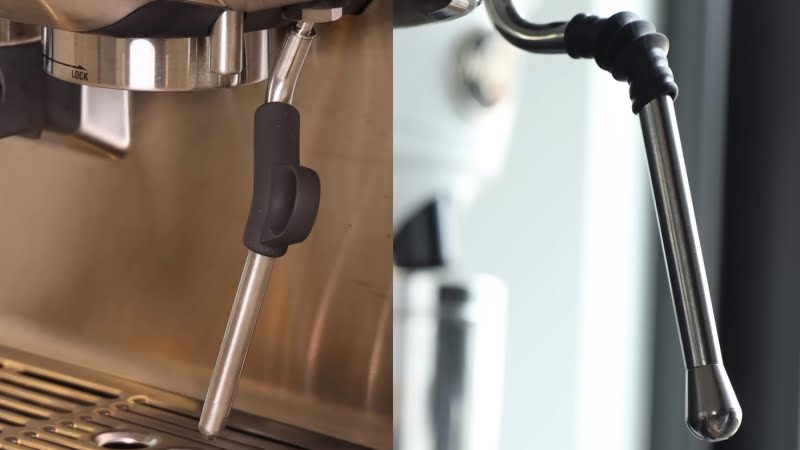
Cleaning & Maintenance
Winner: Breville Barista Express
The semi-automatic Barista Express wins this round owing to its convenience in cleaning and maintenance. The Barista Express has the descale mode, reducing the manual work of cleaning and descaling for users. Conversely, doing the cleaning and descaling cycles on the Gaggia Classic Pro is completely manual, and there is also no indicator reminding you to run these cycles.
Regarding the Barista Express, it has both cleaning and descaling alerts for you, so you don’t need to remember the time yourself. Besides, the descale mode on the Barista Express makes descaling the machine faster and easier as I just need to press the button or turn the knob one time to initiate the cycle, and then the machine will do the rest.
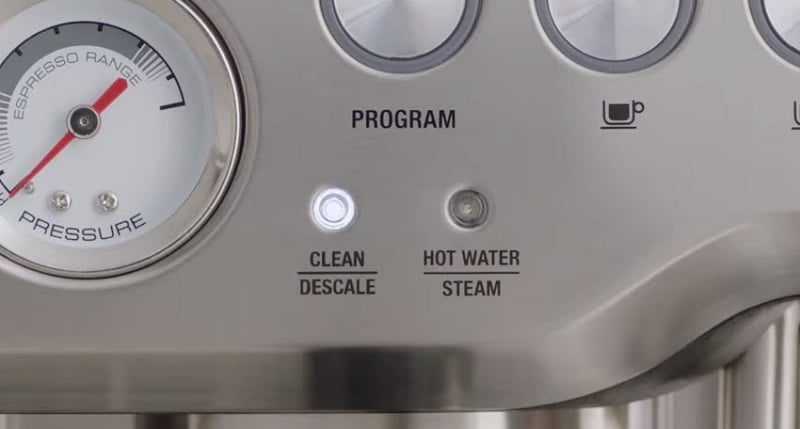
Moreover, the auto-purge function of the Barista Express’s steam wand contributes to making the cleaning less daunting. I am no longer afraid of forgetting to purge the milk wand after use. It is worth noting that no matter which machine you use, either the Barista Express or Gaggia Classic Pro, you should wipe the steam wand with a damp cloth and ensure it is purged after every use. In this way, the machines can function well and not damage your drinks’ flavors.
Besides, the rest of these two machines are easy to clean and maintain. Their drip trays and water tanks are easily removed for cleaning regularly. It is also essential to wash the drip tray regularly to avoid unpleasant smells caused by coffee drips and milk residues.
Quick Rundown of Breville Barista Express
- The Breville Barista Express delivers third wave specialty coffee at home using the 4 keys formula and is part of the Barista Series that offers all in one espresso machines with integrated grinder to go from beans to espresso in under one minute
- DOSE CONTROL GRINDING: Integrated precision conical burr grinder grinds on demand to deliver the right amount of freshly ground coffee directly into the portafilter for your preferred taste with any roast of bean
- OPTIMAL WATER PRESSURE: Low pressure pre-infusion gradually increases pressure at the start and helps ensure all the flavors are drawn out evenly during the extraction for a balanced tasting cup
- Receive 2 free bags of specialty coffee when you purchase and register any Breville coffee machine; T and Cs apply
- PRECISE ESPRESSO EXTRACTION: Digital temperature control (PID) delivers water at precisely the right temperature, ensuring optimal espresso extraction
Last update on 2025-12-20 / Affiliate links / Images from Amazon Product Advertising API
Quick Rundown of Gaggia Classic Pro
- Solid Steel Housing, Made in Italy
- 9 Bar Espresso Extractions
- Stainless Steel 58mm Commercial Portafilter
- Commercial Three Way Solenoid Valve
- Commercial Steam Wand
Last update on 2025-12-20 / Affiliate links / Images from Amazon Product Advertising API
Product Videos
Related Articles to Breville Barista Express
- Breville Barista Express Vs Rancilio Silvia: How Are They Different?
- Breville Nespresso Creatista Plus Vs Barista Express – Which Machine Is Suitable For You?
- Saeco Incanto vs Breville Barista Express: Is Super-automatic Machines Always Better Than Semi-automatics?
- Gaggia Brera vs Breville Barista Express: Don’t Miss My Review On These 2 Affordable Entry Espresso Machines
- Gaggia Anima Vs Breville Barista Express: Battle Of Two Budget-Oriented Espresso Machines!
- Delonghi Magnifica S Smart vs Breville Barista Express: Comparison Of 2 Very Distinctive Espresso Makers
- An Honest Review Of Breville Barista Express vs Oscar 2: Brew Performance, Milk Frother, And More!
- Breville Barista Express vs Delonghi Magnifica XS: An Honest Review Of My Real Experience With These Machines
- Barista Express 870 vs 875: Is There Any Difference Between These Models? – Quick Comparison
- Delonghi Magnifica S vs Breville Barista Express: Which One Brews Tastier Coffee?
- Breville Duo Temp Pro vs Barista Express: Why you should go for the Barista Express
- Breville Oracle Touch Vs Barista Express: Competition Between 2 Top Breville Machines
- Breville Bambino Plus Vs Barista Express: 4 Hot Features You Need To Know
- Breville Dual Boiler Vs Barista Express: A Wonderful Comparision For You
- Breville Barista Express Vs Delonghi La Specialista: Detailed Comparison!
- Breville Barista Express Vs Barista Pro: A Detailed Side-By-Side Comparison
- Breville Barista Express Vs Philips 3200: A Hands-On Comparison
- Breville Creatista Plus Vs Barista Express: Don’t Miss This Incredible Comparison
- Breville Barista Express vs Infuser: A Battle Between 2 Great Espresso Machine
- Barista Express Vs Oracle: Which Breville Espresso Machine Is Best for You?
- Barista Express Vs La Specialista: A Hot Comparision You Should Not Miss
- Breville Barista Express vs Bambino: Battle Of the 2 Top Beginner Coffee Machines On the Market
- Barista Express Vs Barista Touch: Which One You Should Choose?
- Breville Barista Express Vs Bambino Plus: Amazing Comparison You Should Read
- Nespresso Creatista Plus vs Breville Barista Express: What Is The Best Choice For Home Use?
- Breville Cafe Roma vs Barista Express: What Is the Best Espresso Machine?
Related Articles to Gaggia Classic Pro
- Gaggia Brera vs Classic Pro: Which Model Should You Choose? Are Fully-automatics better?
- Gaggia Carezza Deluxe vs Classic Pro: Comparison Of The Two Espresso Machines For Entry-level
- Gaggia Classic Pro vs Quickmill 820: 2 Machines With Secure Mounting – Which One Brews Better Espresso?
- Flair Pro 2 vs Gaggia Classic Pro: A Worthwhile Debate Of Conventional Vs Unique Machines
- Flair 58 Vs Gaggia Classic Pro: Detailed Comparing to Find The Better One
- Rancilio Silvia M Vs Gaggia Classic Pro: A Detailed Comparison
- Lelit Anna 2 Vs Gaggia Classic Pro: Which One Do I Prefer More?
- Gaggia Classic vs Gaggia Classic Pro: Which Version Is Better?
- Lelit Anna Vs Gaggia Classic Pro: Which Semi-automatic Machine Is Better?
- Breville Infuser vs Gaggia Classic Pro: Honest Comparison Of 2 Budget Machines For Beginners
- Breville Duo Temp Pro vs Gaggia Classic Pro: 5 Differences To Find Out Why You Should Invest In the Duo Temp Pro
- Breville Bambino Plus Vs Gaggia Classic Pro: Which Is Suitable For Your Taste?
References:
- Breville Barista Express: https://www.breville.com/us/en/products/espresso/bes870.html
- Gaggia Classic Pro Evo: https://www.gaggia-na.com/collections/espresso-machines/products/gaggia-classic-pro#specs

I’m Floyd J. Alcock, an experienced barista with a deep love for coffee. I curate personalized coffee experiences, guiding customers through diverse flavor profiles and suggesting ideal brewing methods. My extensive knowledge of espresso machines enables me to recommend the best equipment to match specific needs and budgets. Sharing my expertise and passion with coffee enthusiasts brings immense satisfaction. I look forward to continuing my journey of coffee discovery with every customer I serve, fostering connections over a shared love for this magical beverage.
